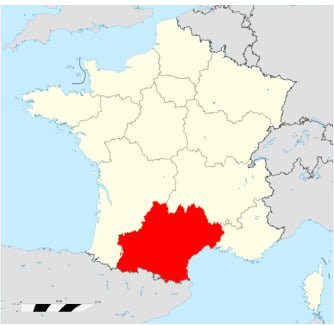What is it?
If you haven’t come across aligot before, it’s basically a superior form of cheesy mash – it’s made by mixing mashed potato with butter, garlic, cream and cheese.
The traditional cheese used is Laguiole but you can also use tomme or any cheese that goes stringy when stretched. The stretchiness is important, and we’ll come back to that later.
Where can I find it?
Aligot (pronounced alley-go) is a traditional dish of the Aveyron département in southern France, but it’s also popular in the Auvergne area and is pretty widely available across France, particularly in the centre and south.
As well as being served in restaurants it’s also a staple dish for sale at France’s various Christmas markets and winter festivals, where it’s often served with a sausage.
You can of course make your own – recipe here.
When should I eat it?
It’s generally served in the winter. There isn’t a hard-and-fast rule on this, but mashed potato in general tends to be more of a winter comfort food and as we mentioned aligot is a popular offering at Christmas markets. Some sports grounds also sell it as a pre-match snack.
How should I eat it?
It goes with most things but is often served as a side to meaty dishes like a bœuf bourguignon, while a Toulouse sausage is also a classic accompaniment.
And before you eat it, you should see how far you can stretch it – just for fun.
As we mentioned, the cheese you use needs to be one that goes stringy when heated and this means that a classic aligot is a very stretchy foodstuff indeed.
In fact, festivals in central and southern France often include a stretching competition to see who can produce the stretchiest mash.
The preferred technique for this seems to be a vertical stretch – the contestant mounts a ladder or cherry-picker and works in a team with the person on the ground next to the pan of aligot to keep stretching it upwards until the string finally breaks.
The world record for the stretchiest aligot was set in 2020 by four brothers who managed to stretch theirs for 6.2 metres, getting it as high as the roof of their house.
READ MORE: Rules of Raclette: How to make France’s cheesy winter classic
Check out the very hilarious video below of their record-breaking efforts (the record-breaking championships tend to take place in the summer when it is easier to keep the aligot warm and therefore at maximum stretchiness).
You can hear more about aligot – as well as some of France’s more bizarre food festivals – in the latest edition of the Talking France podcast.
Find all episodes of the podcast HERE.




 Please whitelist us to continue reading.
Please whitelist us to continue reading.
Member comments